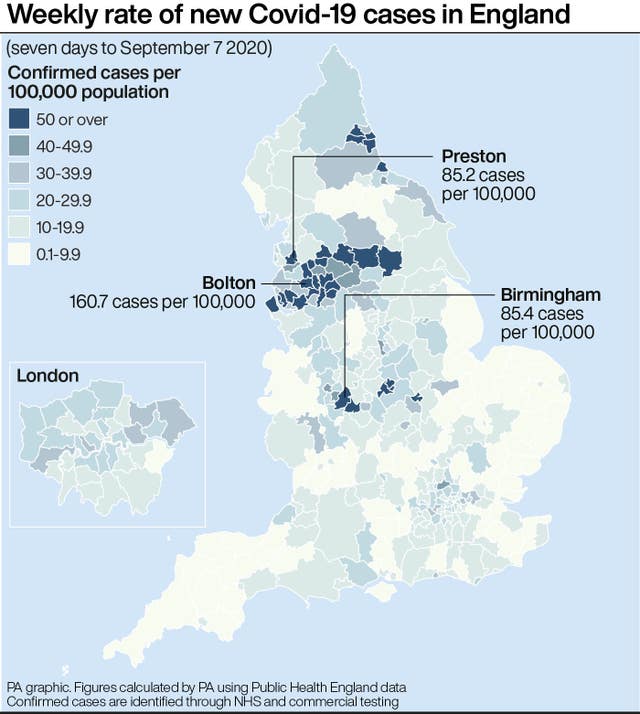
Experts have warned people cannot be complacent as evidence showed coronavirus cases rising and the UK’s R number climbing above 1.
New data suggesting a rise in infections came as stricter measures were imposed on Birmingham in the latest local lockdown announcement, after a spike in cases there.
The city and neighbouring Solihull and Sandwell boroughs all face a ban from next week on socialising between people outside their own household.
Also on Friday, the Government revealed a launch date for the delayed NHS app which it hopes will help to contain the virus during what the Health Secretary described as a “critical time”.
The tracing app is due to be rolled out across England and Wales on September 24, and pub goers and diners will be among those urged to download it and check themselves in to venues.
Matt Hancock said it is “vital” the NHS Test and Trace system is used to reach as many people as possible to prevent outbreaks and “stop this virus in its tracks”.
Data released by the Government Office for Science and the Scientific Advisory Group for Emergencies (Sage) shows the estimate for the R value – the reproduction number of coronavirus transmission – across the UK is between 1.0 and 1.2.
According to Government advisers, the last time R was above 1 was in early March.
Elsewhere, Office for National Statistics (ONS) estimates suggested there has been a rise in daily infections in England.
The ONS said the rate of new infections in private households was estimated to be at an average of 3,200 people per day between August 30 and September 5, up from 2,000 the previous week.
Katherine Kent, co-head of analysis for the Covid-19 Infection Survey, said its latest results suggest a rise in Covid-19 infections in England during recent weeks, with higher infection rates among 17 to 34-year-olds.
She said: “These findings highlight how important it is that we continue to monitor Covid-19 infections in the country.”
Separately, new data from an Imperial College London study suggested coronavirus cases in England were doubling every seven to eight days at the beginning of September.
The findings of the latest round of the Real-Time Assessment of Community Transmission (REACT-1) study suggest the virus is now spread more widely in the community, those behind the research said.
Professor Paul Elliott, director of the programme at Imperial from the School of Public Health, said the “large and robust dataset clearly shows a concerning trend in coronavirus infections, where cases are growing quickly across England and are no longer concentrated in key workers”.
He added: “What we are seeing is evidence of an epidemic in the community and not a result of increased testing capacity.
“This is a critical time and it’s vital that the public, our health system and policy-makers are aware of the situation as we cannot afford complacency.”

Professor James Naismith, director of the Rosalind Franklin Institute and professor of structural biology at the University of Oxford, said: “Many scientists have warned that Covid-19 was a marathon, not a sprint.
“Winter is likely to be a time of maximum danger and this is fast approaching. What happens next will be determined by a number of factors, some in our control and some not.”
He added: “The more people wash their hands and practise social distancing – especially by and around the vulnerable – the lower the number of deaths and illness we will see.”


Comments: Our rules
We want our comments to be a lively and valuable part of our community - a place where readers can debate and engage with the most important local issues. The ability to comment on our stories is a privilege, not a right, however, and that privilege may be withdrawn if it is abused or misused.
Please report any comments that break our rules.
Read the rules here